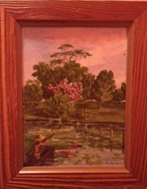The Destruction of Beauty by the Hands of Its Makers
The room, packed with thick black frames and flannel, swelled with heat, noise, and the smell of free beer wafting from hundreds of plastic cups. In the corner, writers posed in an old fashioned photo booth and waited the mandatory three minutes for their overexposed pictures. I was exhausted by a day of travel from Washington (city) to Washington (state) followed by AWP panels and eager writers whom I tried to convince to send me travel poetry—and yet, I rode a manic high. This was Tin House, a magazine that intimidated me so thoroughly that I didn’t even introduce myself to the editors, despite my recent book publication. Tonight I would finally get to see several writers who had “made it,” had earned their way to a slot reading at Chop Suey in front of a room full of envious colleagues. One of the editors, whom I didn’t know by name due to my aforementioned introduction awkwardness, took the stage to introduce the first reader, and my body tensed in anticipation.
Unfortunately, though the editor spoke into the microphone in a clear, loud voice, as did the writer who read after him, I couldn’t hear a word. All I could hear, assailing my ears like so many untuned instruments, were the voices of the disrespectful writers who talked over the man sharing a personal piece about his father, and over the next writer, and over the next writer after that.
I had never been so furious.
The next night, while waiting to enter a Henry at War concert, I went to the bathroom in a Seattle bar and saw this hung on the stall in front of me:
Though normally I might have overlooked the destruction (if you can’t tell, there’s a giant X keyed through that painting), that night it was all I could think about. Though the disrespectful audience at the Tin House reading and the woman who had keyed a beautiful painting in a bathroom stall shared a view of the world in which they could destroy, at their whim, a piece of art that someone had created, they differed in that the writers, without a doubt, knew better. These were writers who had travelled across the country and then across the city to rub shoulders with a group of editors they wanted to impress, yet even they could not give their fellow artists the little bit of recognition they desired.
It therefore did not surprise me when, later in the conference, publisher friends told me about their poor book sales. “No one is buying,” one of them told me, and he was right. Writers scoured the rooms for magazine editors and publishers they wanted to slip their business card or hound about a recent Submittable “in progress” switch, but they didn’t want to read the work of the men and women those editors and publishers enjoyed. If we, as artists, cannot support each other as we navigate the waters of conferences, submissions, and publications, how can we expect anyone else to do the same? If you’re reading this, and you’re a writer, please think about supporting an indie press by buying a book or an indie magazine by purchasing a subscription. Trust me, expanding your realm of knowledge will benefit you even more than it will benefit them. And maybe, in this ever-changing writing world, a little more knowledge is exactly what we need.

Leave a Reply